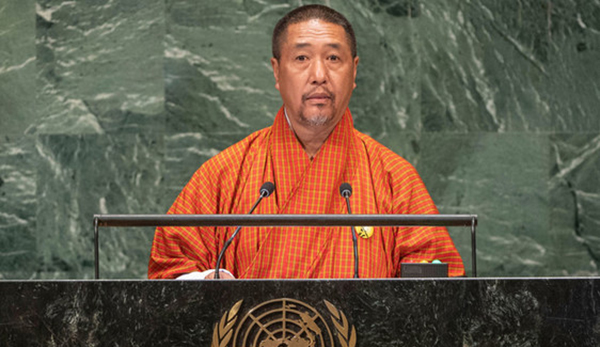 Addressing the United Nations’ 73rd General Assembly in New York, the Chief Advisor Tshering Wangchuk said it’s important that Bhutan’s graduation from the Least Developed Countries (LDC) category is paced to enable the country to prepare for the impact resulting from the withdrawal of international support measures.
Addressing the United Nations’ 73rd General Assembly in New York, the Chief Advisor Tshering Wangchuk said it’s important that Bhutan’s graduation from the Least Developed Countries (LDC) category is paced to enable the country to prepare for the impact resulting from the withdrawal of international support measures.
Bhutan was recommended for graduation from the LDC category by the United Nation’s Committee for Development Policy (UNCDP) as the country has met two of the three criterion for LDC graduation.
The committee made the recommendation at the consecutive triennial reviews of the UNCDP held in 2015 and March this year.
In June this year, the Gross National Happiness Commission (GNHC) requested the UNCDP to consider its graduation in 2023, which will coincide with the end of the 12th Five Year Plan (FYP).
Bhutan is actually scheduled for graduation in 2021.
The GNHC said Bhutan sought an extension of the standard three year transition period by additional two years in recognition of the work that needs to be continued and to prepare not only for graduation but also beyond graduation.
The Chief Advisor highlighted this in his address at the UN General Assembly.
“The forthcoming 12th five-year national development plan from 2018 to 2023 is critical as it’s Bhutan’s last plan as an LDC and will serve as a transition strategy for graduation. Efforts during the period will focus on consolidating past progress and addressing the remaining last mile challenges to build a strong foundation for a vibrant, resilient and sustainable economy towards achieving SDGs,” he said.
The Chief Advisor said Bhutan looks forward to undertaking its graduation from LDC in a sustainable manner by building productive capacity and economic resilience to ensure there is no back slippage on the hard-earned development gains.
“The pace of graduation must be able to absorb the withdrawal of international support measures. A smooth transition is thus critical to ensure that graduation is sustainable and does not disrupt the ongoing development plans and processes,” he added.
Bhutan has achieved two of the three thresholds to be eligible to graduate from the LDC category. They are the Gross National Income (GNI) Index and the Human Asset Index.
The GNI threshold of three-year average for graduation is US$ 1,242 per person. Bhutan has met this criterion with its GNI per person standing at more than USD 2,400 as of March 2018.
The country’s Human Asset Index has improved from 45 in 2000 to close to 73 in 2018, driven mainly by an increase in gross secondary education enrollment.
The third and the final threshold that Bhutan has not been able to achieve is the Economic Vulnerability Index threshold.
“Bhutan continues to face serious challenges in terms of its narrow economic base and vulnerability to natural disasters,” the Chief Advisor told the gathering of world leaders.
He also called for action at international, regional, national and local levels to combat the threats of climate change.
He added Bhutan remains committed to upholding its 2009 commitment to remain carbon neutral and reaffirms its pledge to fulfilling its commitments to the Paris Agreement for Climate Change.
He also reported that Bhutan is well on track in terms of achieving the sustainable development goals (SDGs).






